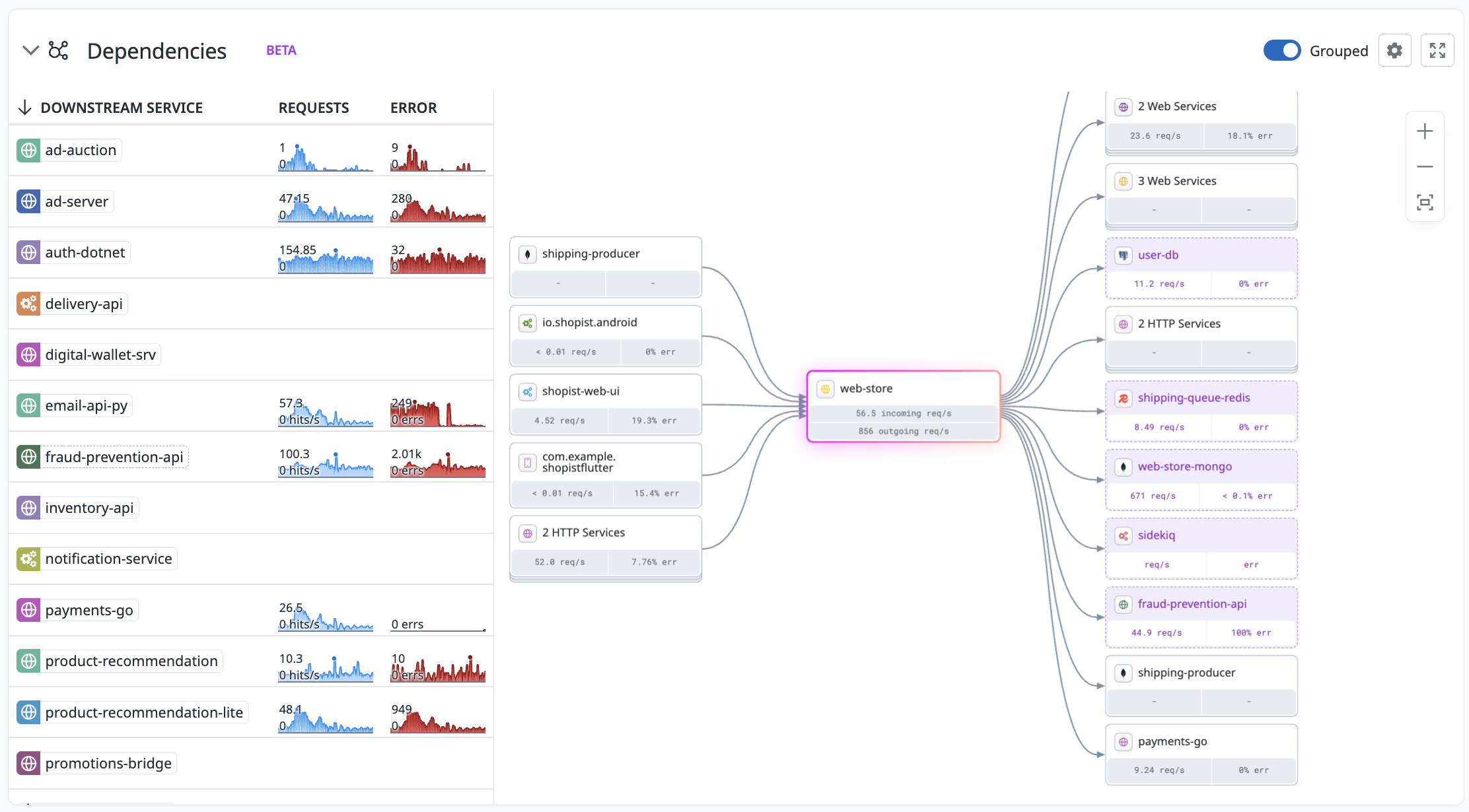- Essentials
- Getting Started
- Datadog
- Datadog Site
- DevSecOps
- Serverless for AWS Lambda
- Agent
- Integrations
- Containers
- Dashboards
- Monitors
- Logs
- APM Tracing
- Profiler
- Tags
- API
- Service Catalog
- Session Replay
- Continuous Testing
- Synthetic Monitoring
- Incident Management
- Database Monitoring
- Cloud Security Management
- Cloud SIEM
- Application Security Management
- Workflow Automation
- CI Visibility
- Test Visibility
- Test Impact Analysis
- Code Analysis
- Learning Center
- Support
- Glossary
- Standard Attributes
- Guides
- Agent
- Integrations
- OpenTelemetry
- Developers
- Authorization
- DogStatsD
- Custom Checks
- Integrations
- Create an Agent-based Integration
- Create an API Integration
- Create a Log Pipeline
- Integration Assets Reference
- Build a Marketplace Offering
- Create a Tile
- Create an Integration Dashboard
- Create a Recommended Monitor
- Create a Cloud SIEM Detection Rule
- OAuth for Integrations
- Install Agent Integration Developer Tool
- Service Checks
- IDE Plugins
- Community
- Guides
- API
- Datadog Mobile App
- CoScreen
- Cloudcraft
- In The App
- Dashboards
- Notebooks
- DDSQL Editor
- Sheets
- Monitors and Alerting
- Infrastructure
- Metrics
- Watchdog
- Bits AI
- Service Catalog
- API Catalog
- Error Tracking
- Service Management
- Infrastructure
- Application Performance
- APM
- Continuous Profiler
- Database Monitoring
- Data Streams Monitoring
- Data Jobs Monitoring
- Digital Experience
- Real User Monitoring
- Product Analytics
- Synthetic Testing and Monitoring
- Continuous Testing
- Software Delivery
- CI Visibility
- CD Visibility
- Test Optimization
- Code Analysis
- Quality Gates
- DORA Metrics
- Security
- Security Overview
- Cloud SIEM
- Cloud Security Management
- Application Security Management
- AI Observability
- Log Management
- Observability Pipelines
- Log Management
- Administration
Inferred services
Overview
Datadog automatically discovers the dependencies for an instrumented service, such as databases, queues, or third-party APIs, even if that dependency hasn’t been directly instrumented. By analyzing outbound requests from your instrumented services, Datadog infers the presence of these dependencies and collects associated performance metrics.
Explore inferred services in the Service Catalog by filtering entries by entity type, such as database, queue, or third-party API. Each service page is tailored to the type of service you are investigating. For instance, database service pages show database-specific insights and include database monitoring data if you are using Database Monitoring.
Set up inferred services
To see inferred services, you must enable some Datadog Agent configurations.
For Datadog Agent versions 7.55.1 or later, add the following to your datadog.yaml configuration file:
datadog.yaml
apm_config:
compute_stats_by_span_kind: true
peer_tags_aggregation: trueAlternatively, set these environment variables in your Datadog Agent configuration:
DD_APM_COMPUTE_STATS_BY_SPAN_KIND=true
DD_APM_PEER_TAGS_AGGREGATION=trueIf you are using Helm, include these environment variables in your values.yaml file.
For Datadog Agent versions 7.50.3 through 7.54.1, add the following to your datadog.yaml configuration file:
datadog.yaml
apm_config:
compute_stats_by_span_kind: true
peer_tags_aggregation: true
peer_tags: ["_dd.base_service","amqp.destination","amqp.exchange","amqp.queue","aws.queue.name","aws.s3.bucket","bucketname","cassandra.keyspace","db.cassandra.contact.points","db.couchbase.seed.nodes","db.hostname","db.instance","db.name","db.namespace","db.system","grpc.host","hostname","http.host","http.server_name","messaging.destination","messaging.destination.name","messaging.kafka.bootstrap.servers","messaging.rabbitmq.exchange","messaging.system","mongodb.db","msmq.queue.path","net.peer.name","network.destination.name","peer.hostname","peer.service","queuename","rpc.service","rpc.system","server.address","streamname","tablename","topicname"]Alternatively, set these environment variables in your Datadog Agent configuration:
DD_APM_COMPUTE_STATS_BY_SPAN_KIND=true
DD_APM_PEER_TAGS_AGGREGATION=true
DD_APM_PEER_TAGS='["_dd.base_service","amqp.destination","amqp.exchange","amqp.queue","aws.queue.name","aws.s3.bucket","bucketname","cassandra.keyspace","db.cassandra.contact.points","db.couchbase.seed.nodes","db.hostname","db.instance","db.name","db.namespace","db.system","grpc.host","hostname","http.host","http.server_name","messaging.destination","messaging.destination.name","messaging.kafka.bootstrap.servers","messaging.rabbitmq.exchange","messaging.system","mongodb.db","msmq.queue.path","net.peer.name","network.destination.name","peer.hostname","peer.service","queuename","rpc.service","rpc.system","server.address","streamname","tablename","topicname"]'If you are using Helm, include these environment variables in your values.yaml file.
For the OpenTelemetry Collector, the minimum recommended version is opentelemetry-collector-contrib v0.95.0 or later. In that case, update this configuration:
connectors:
datadog/connector:
traces:
compute_stats_by_span_kind: true
peer_tags_aggregation: true
peer_tags: ["_dd.base_service","amqp.destination","amqp.exchange","amqp.queue","aws.queue.name","aws.s3.bucket","bucketname","db.cassandra.contact.points","db.couchbase.seed.nodes","db.hostname","db.instance","db.name","db.namespace","db.system","grpc.host","hostname","http.host","http.server_name","messaging.destination","messaging.destination.name","messaging.kafka.bootstrap.servers","messaging.rabbitmq.exchange","messaging.system","mongodb.db","msmq.queue.path","net.peer.name","network.destination.name","peer.hostname","peer.service","queuename","rpc.service","rpc.system","server.address","streamname","tablename","topicname"]If your Collector version is below v0.95.0, update the following Collector configuration:
exporters:
datadog:
traces:
compute_stats_by_span_kind: true
peer_tags_aggregation: true
peer_tags: ["_dd.base_service","amqp.destination","amqp.exchange","amqp.queue","aws.queue.name","aws.s3.bucket","bucketname","db.cassandra.contact.points","db.couchbase.seed.nodes","db.hostname","db.instance","db.name","db.namespace","db.system","grpc.host","hostname","http.host","http.server_name","messaging.destination","messaging.destination.name","messaging.kafka.bootstrap.servers","messaging.rabbitmq.exchange","messaging.system","mongodb.db","msmq.queue.path","net.peer.name","network.destination.name","peer.hostname","peer.service","queuename","rpc.service","rpc.system","server.address","streamname","tablename","topicname"] Example: collector.yaml.
Naming inferred entities
To determine the names and types of the inferred service dependencies, Datadog uses standard span attributes and maps them to peer.* attributes. For example, inferred external APIs use the default naming scheme net.peer.name like api.stripe.com, api.twilio.com, and us6.api.mailchimp.com. Inferred databases use the default naming scheme db.instance.
Peer tags
| Peer Tag | Source Attributes |
|---|---|
peer.aws.dynamodb.table | tablename |
peer.aws.kinesis.stream | streamname |
peer.aws.s3.bucket | bucketname, aws.s3.bucket |
peer.aws.sqs.queue | queuename |
peer.cassandra.contact.points | db.cassandra.contact.points |
peer.couchbase.seed.nodes | db.couchbase.seed.nodes |
peer.db.name | db.name, mongodb.db, db.instance, cassandra.keyspace, db.namespace |
peer.db.system | db.system |
peer.hostname | peer.hostname, hostname, net.peer.name, db.hostname, network.destination.name, grpc.host, http.host, server.address, http.server_name |
peer.kafka.bootstrap.servers | messaging.kafka.bootstrap.servers |
peer.messaging.destination | topicname, messaging.destination, messaging.destination.name, messaging.rabbitmq.exchange, amqp.destination, amqp.queue, amqp.exchange, msmq.queue.path, aws.queue.name |
peer.messaging.system | messaging.system |
peer.rpc.service | rpc.service |
peer.rpc.system | rpc.system |
peer.service | peer.service |
Migrate to global default service naming
With inferred services, service dependencies are automatically detected from existing span attributes. As a result, changing service names (using the service tag) is not required to identify these dependencies.
Enable DD_TRACE_REMOVE_INTEGRATION_SERVICE_NAMES_ENABLED to ensures no Datadog integration sets service names that are different from the default global service name. This also improves how service-to-service connections and inferred services are represented in Datadog visualizations, across all supported tracing library languages and integrations.
Enabling this option may impact existing APM metrics, custom span metrics, trace analytics, retention filters, sensitive data scans, monitors, dashboards, or notebooks that reference the old service names. Update these assets to use the global default service tag (
service:<DD_SERVICE>).For instructions on how to remove service overrides and migrate to inferred services, see the Service Overrides guide.
The Inferred Services feature is not available by default in your datacenter. Fill out this form to request access.
Further Reading
Additional helpful documentation, links, and articles:

